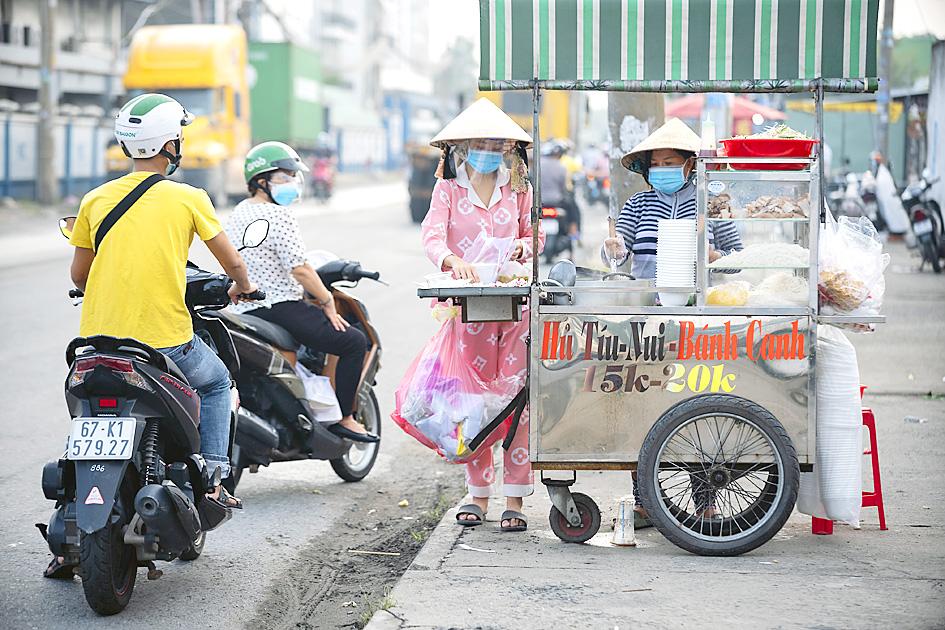Units of Intel Corp and Samsung Electronics Co are targeting to resume full operations of their Ho Chi Minh City plants by the end of next month, a move that could provide relief to global supply chains.
Saigon Hi-Tech Park is helping its tenants, many of which are running at about 70 percent capacity, to operate fully next month, park deputy manager Le Bich Loan said in a phone interview.
She did not elaborate on the steps the park is taking, particularly efforts at bringing back workers who fled to home provinces.

Photo: Bloomberg
The Ho Chi Minh City unit of Nidec Sankyo Corp, maker of magnetic card readers and micro motors, also expects to return to full operations late next month, Saigon Giai Phong newspaper reported, citing Loan.
The technology park is home to dozens of factories that produce components or services for global companies.
Representatives of Samsung, Intel and Nidec Sankyo did not immediately respond to requests for comment.
Many companies operating in Saigon Hi-Tech Park lost about 20 percent of their export orders in July and August, Loan was quoted as saying by Saigon Giai Phong.
COVID-19 infections surged in Vietnam during those months, prompting movement restrictions and, in some factory belts, government requirements to provide on-site sleeping arrangement for workers or shut down.
Samsung in July shut three of its 16 workshops in Saigon Hi-Tech, as it also reduced workers at its HCMC CE Complex by more than half.
Intel, which has a test and assembly plant in Saigon Hi-Tech, had its workers on a sleepover arrangement to avoid halting operations.
While small, Vietnam plays an out-sized role in the global consumer economy, supplying everything from Walmart Inc furniture and Adidas AG sneakers to Samsung smartphones.
After China, it is the second-largest supplier of clothes and shoes to the US, according to the American Apparel and Footwear Association. Its importance increased during the trade dispute between the US and China, as manufacturing moved there to avoid tariffs.
At this point, there is little brands like Nike Inc, which recently cut its sales forecast largely on the lack of goods from Vietnam, can do. Factories in other countries are overloaded with orders, and it would take months to train workers and move machinery.
The missed production would be especially apparent at retailers in December and extend well into the first quarter, said Camilo Lyon, an analyst for BTIG who projected that output from Vietnam would not return to normal until the middle of next year.
The full impact of this upheaval has not been priced into the stocks of apparel and footwear companies with big exposure to Vietnam, he said.
“The challenges are by no means over,” Lyon said.

Merida Industry Co (美利達) has seen signs of recovery in the US and European markets this year, as customers are gradually depleting their inventories, the bicycle maker told shareholders yesterday. Given robust growth in new orders at its Taiwanese factory, coupled with its subsidiaries’ improving performance, Merida said it remains confident about the bicycle market’s prospects and expects steady growth in its core business this year. CAUTION ON CHINA However, the company must handle the Chinese market with great caution, as sales of road bikes there have declined significantly, affecting its revenue and profitability, Merida said in a statement, adding that it would

RISING: Strong exports, and life insurance companies’ efforts to manage currency risks indicates the NT dollar would eventually pass the 29 level, an expert said The New Taiwan dollar yesterday rallied to its strongest in three years amid inflows to the nation’s stock market and broad-based weakness in the US dollar. Exporter sales of the US currency and a repatriation of funds from local asset managers also played a role, said two traders, who asked not to be identified as they were not authorized to speak publicly. State-owned banks were seen buying the greenback yesterday, but only at a moderate scale, the traders said. The local currency gained 0.77 percent, outperforming almost all of its Asian peers, to close at NT$29.165 per US dollar in Taipei trading yesterday. The

RECORD LOW: Global firms’ increased inventories, tariff disputes not yet impacting Taiwan and new graduates not yet entering the market contributed to the decrease Taiwan’s unemployment rate last month dropped to 3.3 percent, the lowest for the month in 25 years, as strong exports and resilient domestic demand boosted hiring across various sectors, the Directorate-General of Budget, Accounting and Statistics (DGBAS) said yesterday. After seasonal adjustments, the jobless rate eased to 3.34 percent, the best performance in 24 years, suggesting a stable labor market, although a mild increase is expected with the graduation season from this month through August, the statistics agency said. “Potential shocks from tariff disputes between the US and China have yet to affect Taiwan’s job market,” Census Department Deputy Director Tan Wen-ling

UNCERTAINTIES: The world’s biggest chip packager and tester is closely monitoring the US’ tariff policy before making any capacity adjustments, a company official said ASE Technology Holding Inc (日月光投控), the world’s biggest chip packager and tester, yesterday said it is cautiously evaluating new advanced packaging capacity expansion in the US in response to customers’ requests amid uncertainties about the US’ tariff policy. Compared with its semiconductor peers, ASE has been relatively prudent about building new capacity in the US. However, the company is adjusting its global manufacturing footprint expansion after US President Donald Trump announced “reciprocal” tariffs in April, and new import duties targeting semiconductors and other items that are vital to national security. ASE subsidiary Siliconware Precision Industries Co (SPIL, 矽品精密) is participating in Nvidia